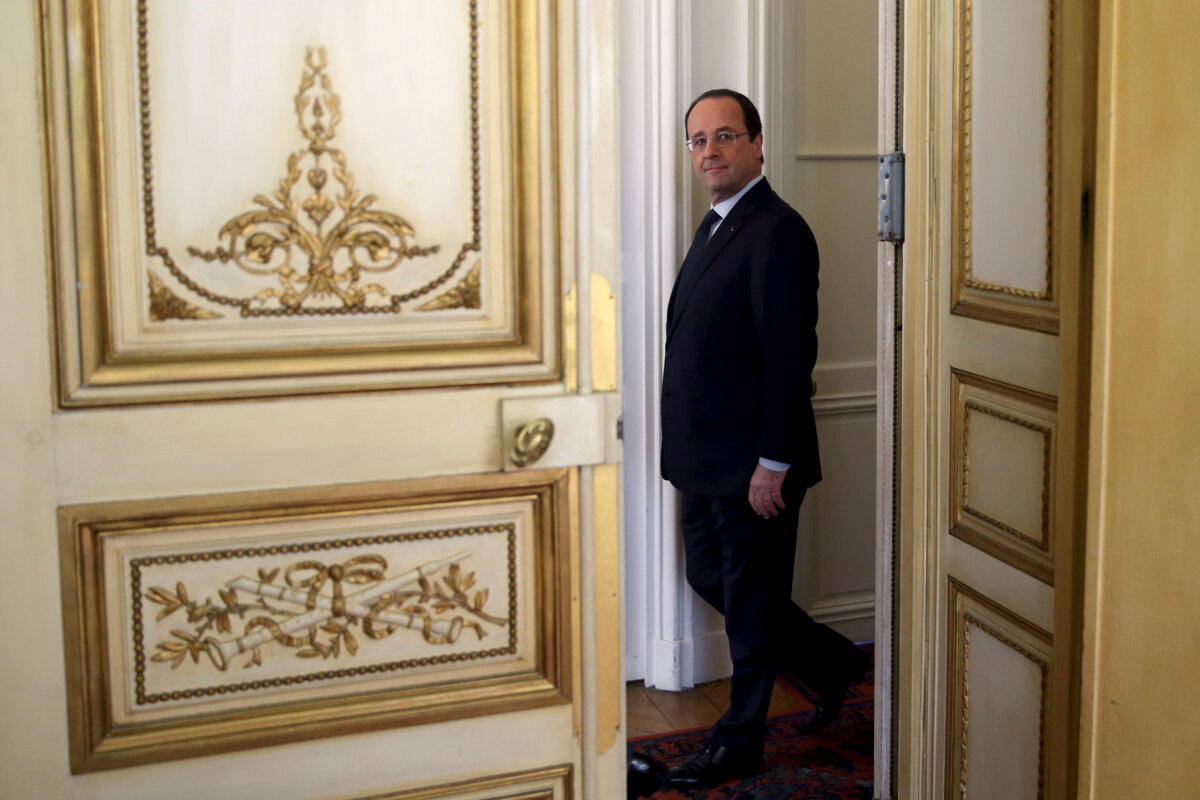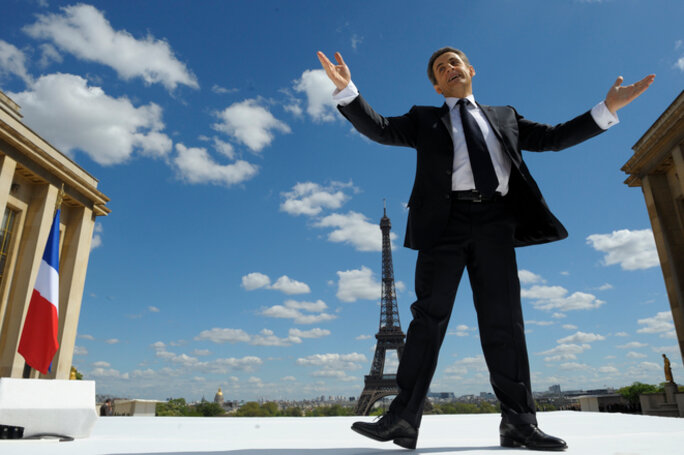In a book published this week in France, Un président ne devrait pas dire ça… (“A president shouldn’t say that…”), which is made up of the transcripts of 61 conversations between François Hollande and two journalists from the newspaper Le Monde, the French president discusses in detail and for the first time the question of “les affaires” – a term in French to describe scandals, mostly those concerning corruption.
The 62-year-old, who came to power in 2012 and who has not yet announced whether he will stand for re-election in elections next April, appears to dislike “affairs”. For him, they represent nothing good, and he sees little electoral benefit from them. “Affairs discredit the whole of the political class, and a bit more, all the same, [Nicolas] Sarkozy,” he told Gérard Davet and Fabrice Lhomme, referring to the former president embroiled in several major scandals, during one of the ‘fireside’ meetings with the journalists. “But nothing should be expected to come from affairs. Today, everything that’s happening is favourable to the Front,” he added, indicating the far-right Front National party.

Enlargement : Illustration 1

Although he is by his function the guarantor of the credibility of France’s institutions, Hollande seems to hold the justice system in poor esteem, and the book even highlights a form of duplicity. On October 7th, while attending the congress of the magistrates’ union, l’Union syndicale des magistrats (USM), the French president declared that “it is firstly the magistrates who deliver justice”. But while talking to Davet and Lhomme he described the justice system as “a cowardly institution”, targeting above all the highest ranks, “all these prosecutors, all these high magistrates, hiding away, playing at being righteous”, adding: “The justice system doesn’t like the politician.”
Numerous pages of the book dealing with “affairs” leave a bitter taste, and Hollande shows no hesitation in talking about ongoing investigations. In face of the devastation caused by corruption in France, which has prompted criticism from international organizations like the OECD, Hollande appears concerned only by the electoral consequences.
It is as if he ignores that the fight against corruption involves the expectations and demands of citizens, a moralization of public life, that also it gives confidence in the democratic process, not to mention that it also retrieves vast sums of money otherwise lost to a nation’s wealth. As if there is no other lesson to be learned, except for a few meagre electoral calculations, from the fact that the portrait of France in 2016 is, along with mass unemployment, the terrorist threat and the obsession with “identity”, that of a country sapped by corruption.
Take the recent record of political life: the leading rival’s to become the conservative Les Républicains party’s presidential election candidate in 2017 are Nicolas Sarkozy, a former president who has been placed under investigation in two judicial anti-corruption probes, and Alain Juppé, a former prime minister who was convicted in 2003 for his role in a scam whereby Paris City Hall paid staff from his political party who were fraudulently listed on the City Hall payroll. Meanwhile, dozens of Sarkozy’s entourage are also implicated in corruption probes. Then there is the case of the Front National which is to stand trial for fraud, while former socialist budget minister under Hollande, Jérôme Cahuzac, awaits the ruling of magistrates after his trial last month for tax evasion. Meanwhile, Christine Lagarde, who served as economy minister under Sarkozy and who is now into her second term as managing director of the International Monetary Fund, has been sent for trial for her role in the now-annulled award of more than 400 million euros of public money to the fallen tycoon and Sarkozy ally Bernard Tapie. Not forgetting, in this incomplete list, the two fraud convictions previously handed to the general secretary of the ruling Socialist Party, Jean-Christophe Cambadélis.
The book by Gérard Davet and Fabrice Lhomme contains numerous examples of Hollande’s contempt (or, at best, disdain) for “affairs”. As the authors themselves write: “He repeated to us often enough [that] he doesn’t rely on the ‘affairs’, which he reckons have a weak impact on the electorate and which in any case don’t benefit the traditional [mainstream] parties - quite the opposite.”
At one point, on the subject of the catalogue of corruption scams, Hollande tells them: “I fear that it be seen as one of the illustrations of the decomposition of the democratic system.” However, capable as he is of employing considerable cynicism, he does not exclude using the scams as ammunition “in a campaign” to win elections.
Hollande refers to a period in 2014, when the conservative opposition was hit by two major scandals: that of the phone taps on a secret mobile phone used by Sarkozy which revealed his attempt to corrupt a leading magistrate, and the revelations of secret tape recordings of conversations with Sarkozy and his entourage made by his one-time presidential advisor Patrick Buisson, (who is currently the subject of a judicial probe into favouritism and misuse of public funds for payments made to him by Sarkozy’s office for a series of opinion surveys). The two scandals occurred within a month of each other. “We had the reversing of the rise in unemployment, the ‘responsibility pact’ [editor’s note: his government’s taxbreaks-for-jobs deal with business leaders], our initiatives over Ukraine,” Hollande tells Davet and Lhomme, complaining: “We were unable to explain everything that we did. Frankly, those ‘affairs’, they don’t serve us […] It has no interest for us.”
When Hollande apologises for transparency reforms
Hollande is questioned by the two journalists about the so-called Bygmalion affair, centred on a system of fake invoicing by communications and events firm Bygmalion during the conservative's 2012 presidential elections. Bygmalion unlawfully billed Nicolas Sarkozy's UMP party (now called Les Républicains) instead of his election team for its role in organising campaign rallies, thereby hiding the enormous breaching by Sarkozy’s campaign of the official limit placed on spending by candidates. In 2014, in one of the 61 conversations which took place over several years, Hollande appears certain of Sarkozy’s responsibility in the scam (which Sarkozy denies having knowledge of). “I didn’t sign the cheques, so I can’t say that Sarkozy signed them,” says Hollande of his own election campaign in 2012, and which ended with his election. “But at a given moment you know, because there is someone who says to you ‘We can’t, we’ll be found out’.”

Enlargement : Illustration 2

Then, back on the same subject in February 2016, he adopts Sarkozy’s defence. “I found that the placing [of Sarkozy] under investigation was perhaps automatic as of the fact that he signed [his approval of the election campaign] accounts, but that it indicated nothing about his knowledge or not of the Bygmalion affair.”
Importantly, the increasing media coverage of the Bygmalion scandal concerned Hollande over the collateral damage he felt would harm himself. “It’s not good for politics,” he argues. “A sizeable section of public opinion must say to itself […] ‘Didn’t the others do the same?’ [Sarkozy] has been caught. And what about Hollande?’” It is as if the judicial investigations are an inconvenience, as if it were unfortunate that such cases awake the vigilance of citizens and the raising of legitimate questions. But they have not prompted Hollande and his parliamentary majority into proposing significant legislation to reinforce controls on political financing.
What the question of corruption scandals do offer Hollande is the chance to stand out from the pack. In a reference to the scandals in which Sarkozy is implicated, he tells Davet and Lhomme, “I have never been placed under investigation […] I have never spied on an investigating judge, I have never asked anything of a magistrate, I have never been funded by Libya.”
Hollande describes the Sarkozy clan as “a gang in the prebendary sense”, led around by a chief who “doesn’t make a separation between what’s legal and not legal, the decent and the non-decent [sic].” Regarding his own camp, Hollande sees only cases of individual wrongdoers, such as the tax evading budget minister Jérôme Cahuzac, or the non-payment of taxes by his trade minister Thomas Thévenoud, who claimed that “administrative phobia” was the cause. “Firstly, there is no system, nothing that is a mechanism for political or electoral, or personal, funding,” Hollande says. “Secondly, there is no protection at all given to anyone at all. Thirdly, the justice system and the press do their job to the full. Fourthly, when an individual is approached by the justice system, he’s dismissed.”
While it is true that three of Hollande’s close entourage have been ‘resigned’, he systematically goes about minimizing their cases. Hollande said his one-time advisor at the presidency, Aquilino Morelle, who was dismissed in 2014 after it was revealed he carried out private consultancy work for a pharmaceutical firm while working for France's public service inspectorate, the Inspection générale des affaires sociales (IGAS), who also unabashedly hired a shoe-cleaner at the Elysée Palace, was guilty of a “blunder”. Another Hollande advisor, Faouzi Lamdaoui, forced to resign also in 2014 after his implication in a case of misuse of company assets and tax fraud (the case was later dismissed on a legal technicality), was only, the president says, investigated over “his past, events that happened before his appointment to the Elysée”. As for Kader Arif, a former Secretary of State for War Veterans who resigned, again in 2014, after his implication in a case of favouritism involving the granting of public contracts to his close entourage, Hollande describes his actions as “carelessness, a thoughtlessness that was not that serious”. An ambivalent Hollande reminds the two journalists that Arif's move “to give work to his brother” would have been “possible” just a few years ago.
Certainly, Hollande has not gone the full length of reforms to enforce probity in political life (he abandoned a plan to dissolve the often tame special Court of Justice of the Republic which is dedicated to investigating and judging wrongdoings by serving members of government, and he has also done nothing to remove the arbitrary powers of the finance ministry in cases of tax fraud), but he has done more to promote morality in public life than his two predecessors: he barred interference by the justice ministry in any individual investigation, he created the special anti-corruption financial investigation service of the public prosecutor’s office (le Parquet national financier, or PNF), the High Authority for Transparency in Public Life (la Haute autorité pour la transparence de la vie publique, or HATVP), and also the French anti-corruption agency (l’Agence française anticorruption).
But he appears somewhat embarrassed about the fact. “It’s true that it’s very unjust for Members of Parliament and Senators, for reasons that a minister […] has committed a fault, to be made to publish [details of] their wealth,” he says. The quote “it’s very unjust”, from a conversation with Davet and Lhomme in 2013, needs to be re-read to be believed. Meanwhile, the declarations by MPs detailing their wealth were finally not published but rather recorded with local prefectures, and can only be consulted on condition that no notes are taken.
Hollande, a former MP and mayor in the rural département (county) of Corrèze in central France, and who was for 11 years leader of the Socialist Party (from 1997 to 2008), knows only too well that his reforms have angered socialist bigwigs (such as party veteran Claude Bartolone, speaker of the lower house, the National Assembly). As a result, he almost excuses himself. “It’s not to do with going about things as if they were suspects, but to say that in the interest of everyone – parliamentarians, ministers, public leaders – we are now, perhaps wrongly, moving towards a demand for transparency,” he says, as if he is a president who is no longer certain of being right.
-------------------------
- The French version of this article can be found here.
English version by Graham Tearse


